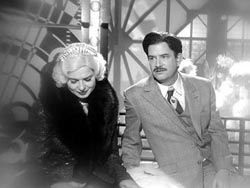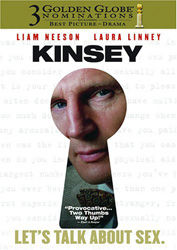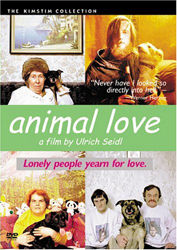DVD Reviews – June 2005
"The Saddest Music in the World" directed by Guy Maddin; "Kinsey" directed by Bill Condon; and "Animal Love" directed by Ulrich Seidl.



The Saddest Music in the World
Directed by Guy Maddin
MGM
It’s true that Guy Maddin’s movies—as is inevitably observed in reviews like this—”aren’t for all tastes.” My first exposure to the Winnipeg director’s warped sensibility came at the Olympia Film Festival a decade ago, when Careful was screened as part of an all-night cult movie marathon. The audience was in the mood for schlock horror, or soft-core porn, or blaxploitation—something very different from what they were about to get. It didn’t take long before people were confused and angry, shifting restlessly in their seats, yawning loudly or huffing outside for a smoke.
I, meanwhile, was transfixed—when I wasn’t strangling myself to keep the laughter down. I’d never seen anything remotely like Careful; the performances were preposterously stilted, the dubbing deliberately terrible, the soundtrack filled with tape hiss, and the plot—something about an isolated mountain village, and a butler college, and a mysterious count, and a mute brother in the attic—relentlessly bizarre. From the opening titles, it resembled some impressionist curio rescued from a forgotten film vault in the Carpathians: soft-focus shots and color filters were used excessively, to clumsy effect; outdoor scenes looked nothing like the real thing. “This is either the worst movie I’ve ever seen,” my friend whispered halfway through, “Or the best.”
The best, I’d say. Lush, thrillingly imaginative, brilliantly witty and deliciously erotic, Maddin’s films—and the snowy dreamworlds they inhabit—offer all the vindication “auteur theorists” could need; nobody but Maddin would ever have thought to construct these crazy things.
The Saddest Music in the World, Maddin’s first full-length feature since 1997’s underrated Twilight of the Ice Nymphs (his boring “filmed ballet,” Dracula: Pages From a Virgin’s Diary, doesn’t count), is satisfyingly true to form. Based (very loosely, one suspects) on a script by Remains of the Day author Kazuo Ishiguro, Saddest Music, set in a fabulized depression-era Winnipeg, tells the story of two brothers—one incapable of feeling sadness, the other incapable of feeling anything but. The two men—along with their father, a maudlin recovering alcoholic—are drawn together after years of estrangement by a “saddest music contest,” sponsored by legless “beer baroness” Lady Port-Huntley (Isabella Rossellini), which threatens, in various ways, to destroy everyone involved. The contest itself is a wonderfully tacky Olympics of heartache, in which teams of musicians respresenting “the saddest nations on earth” face off in one-on-one matches before a drunken crowd (and two vapid commentators); this battle of the bands provides much of the film’s alternately absurd and ironic humor. Beneath the clever jests, however, lies an oddly poignant drama of fathers and sons, fidelity and betrayal, and unrequited love.
Filmed entirely with hand-held cameras, in a variety of stocks and filters, Saddest Music looks very much like a Guy Maddin movie. Maddin seems to have seen every movie ever made, and this film, like all of his others, is filled with visual references to—and inspired thefts from—many of his favorites.
A film this cleverly stylized requires cleverly stylized performances—and Saddest Music’s cast delivers. Mark McKinney (of Kids in the Hall) and Ross McMillan hit all the right notes as the dueling brothers, and Rossellini and Maria de Medeiros (as Narcissa, the estranged wife of one brother and mistress of the other) are utterly enticing. The best moments, though, belong to David Fox, whose performance as the brothers’ jilted father Fyodor is an impressive, improbable blend of winking humor and genuine pathos.
As with all of the Maddin DVDs released thus far, Saddest Music is loaded with fabulous extras; the package includes a revealing, dryly funny making-of documentary (Teardrops in the Snow), lengthy cast interviews, and three fun shorts—including the riotously stupid Sissy-Boy Slap Party. —Matt Williamson
Kinsey
Directed by Bill Condon
20th Century Fox
(2-Disc Set)
This Oscar-nominated biopic of the great sexual liberator Alfred Kinsey (Liam Neeson) lives up to the buzz surrounding its theatrical release. Surprisingly instructive even for modern audiences, the film captures both the mid-century scandal sparked by Kinsey’s research into human sexuality and the smaller personal drama of his complicated relationships with his wife (Laura Linney) and professional intimates with wit and a respectfully gimlet eye. The DVD extras on the second disc are fun, but not terribly elaborate—the best of them is a surprisingly in-depth 80-minute documentary, The Kinsey Report: Sex on Film, on the making of the film and bit of history on the moral furor surrounding Kinsey’s scientific study. The remaining features are forgettable: a lackluster director’s commentary, some silly outtakes, an interactive sex questionnaire, a virtual tour of The Kinsey Institute and some justifiably deleted scenes. —Susannah McNeely
Animal Love
Directed by Ulrich Seidl
Image Entertainment
“Never have I looked so directly into hell,” said famed director Werner Herzog, an admirer of the film, as he left a screening for Animal Love. That about sums it up, really. This (very German) documentary explores the affection marginalized, broken people have for the pets in their lives. I alternated between waiting uncomfortably for the documentary to take a horrific turn and wondering how in the world documentarian Ulrich Seidl was able to get these people to allow him to film them in such warped circumstances. If you’re a believer in the credo that the aim of art is not necessarily to please, but to provoke response, you’ll find this an effective film. You may wish otherwise, but Animal Love isn’t a documentary you’ll soon forget. —SM